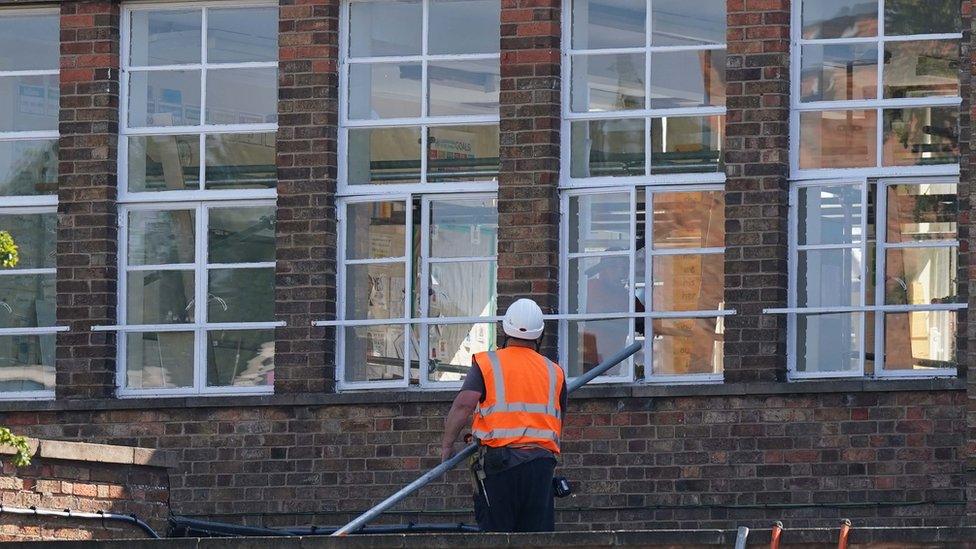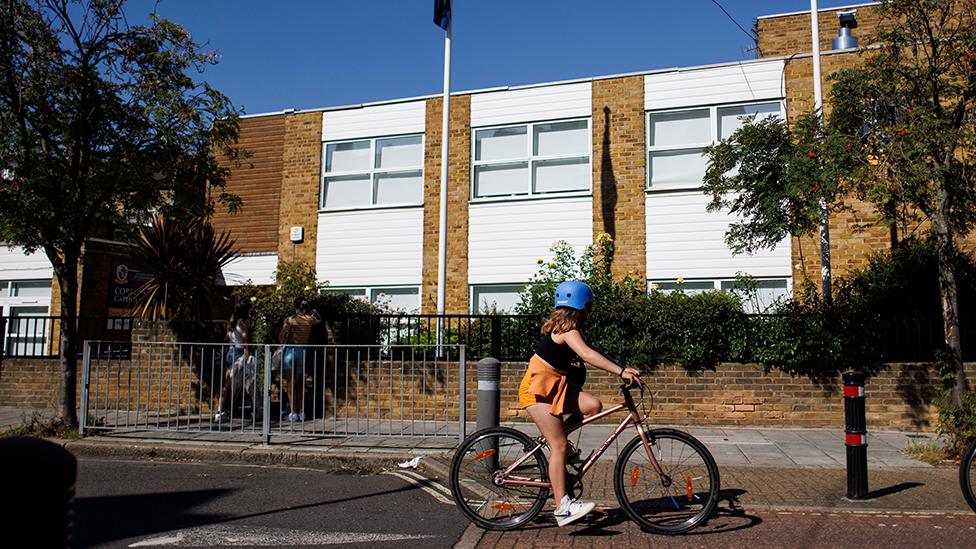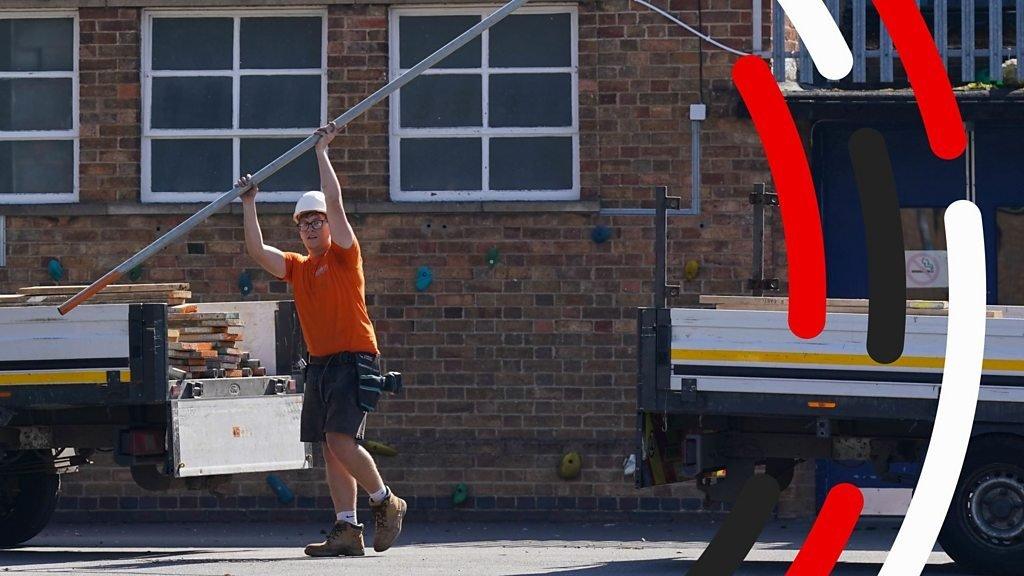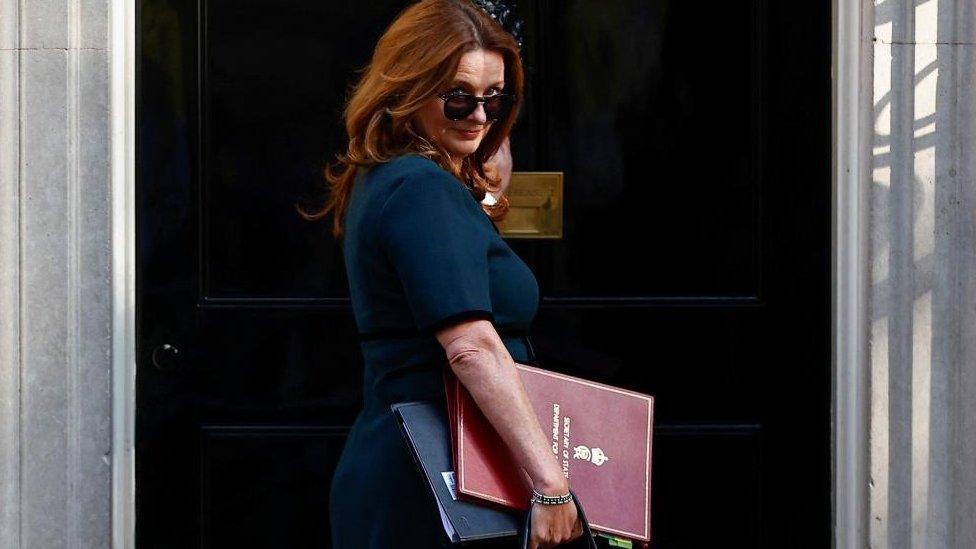Building work was scrapped at 17 schools with RAAC
- Published

The number of schools confirmed to have reinforced autoclaved aerated concrete (RAAC) and which had building projects cancelled in 2010 has risen to 17, BBC research has found.
They had been set for rebuilding under a Labour scheme, later scrapped by the Conservative-led government.
School buildings have now been closed because potentially dangerous RAAC has been found.
The analysis raises questions about whether schools could have been helped earlier with government investment.
BBC Verify looked at schools listed as having their building projects "stopped" in 2010 and then checked these names against a list of schools affected by RAAC (as of 30 August), published by the Department for Education., external on 6 September.
Seventeen schools, which had work cancelled in 2010, are on it.
Before the publication of this list, BBC Verify had found 13 of these schools on a RAAC list, compiled by the BBC.
We double-checked the names of the schools as they were in the 2010 list and as they are now in the official 2023 schools census data.
The Labour scheme - Building Schools for the Future (BSF) - was a £55bn project to renew every secondary school in England, rebuilding half of them and refurbishing or remodelling the rest.
It was ditched by the coalition government, which launched its own school building scheme in 2014.

Schools concrete crisis

The then education secretary Michael Gove said BSF was characterised by "massive overspends, tragic delays, botched construction projects and needless bureaucracy".
There was criticism of the scheme in a National Audit Office (NAO) report, external and a review of the scheme, external - commissioned by the government - found the allocation of funding for school buildings had been "complex, time-consuming, expensive and opaque".
Labour has defended its scheme for "rebuilding schools, the length and breadth of the country".
While there were questions about the value for money in the project, the structural issues for a significant number of schools applying for BSF funding were real.
More than 700 projects were shelved. Mr Gove's department published a list of schools , externalaffected in 2010.
This list stated which ones had work "stopped" but did not detail what this work was.
We don't know whether any of the schools cited problems with concrete in their bids to the BSF scheme.
A lot more is known now about RAAC in schools, particularly after an incident at a school in Kent in 2018, but it's likely that any major rebuilding work would have replaced this problem concrete.
The schools which had work stopped in 2010 and now appear on the government's RAAC list are:
Bishop Douglass School, Finchley - Barnet
Aston Manor Academy - Birmingham
Holy Family Catholic School - Bradford
Ferryhill School - County Durham
Carmel College - Darlington
The Ellen Wilkinson School for Girls - Ealing, London
St Helena School - Essex
The Appleton School - Essex
The Billericay School - Essex
The Bromfords School - Essex
The Gilberd School - Essex
The Thomas Lord Audley School - Essex
Thurstable School Sports College and Sixth Form Centre - Essex
St Thomas More Catholic School, Blaydon - Gateshead
London Oratory School - Hammersmith and Fulham, London
Batley Girls High School - Kirklees
Wood Green Academy - Sandwell, West Midlands
The government says the schools have introduced "mitigations" which include remote learning. Two have delayed the start of their terms.
Watch: Ros Atkins on the government response to crumbling concrete
Many of the 17 schools have had some building work investment since 2010, according to reports in local media.
This ranges from refurbishment of a dining hall and toilets to new art and sports blocks.
The London Oratory School in Fulham had RAAC removed during work on its DT Block and Sixth Form common room, but it is still present in roofing panels elsewhere on the school site.
The Bromfords School in Essex, which missed out on BSF funding, was on a list of schools that successfully applied for government funding in 2022-23, external, some of which was to tackle RAAC.
We have contacted all of the schools involved.
Responding to our findings, a Department for Education (DfE) spokesperson said it was on track to rebuild its target of 500 schools over the next decade as part of the Schools Rebuilding Programme.
"That is on top of 520 schools already delivered since 2015 under the Priority Schools Building Programme," they said, adding that the School Rebuilding Programme was in its early stages so more construction projects would start in the next year.
Geoff Barton, general secretary of the Association of School and College Leaders, called the crumbling concrete crisis a "national scandal".
He told BBC Radio 4's Today programme that while BSF was expensive and over ambitious "it was saying something important - that the nation's schools needed to be refurbished".
"What we've got today in some of those schools is head teachers scrambling around trying to identify concrete that might look like Aero bars when they should be focusing children's learning and development."
Government minister Grant Shapps told BBC Breakfast the BSF programme "clearly couldn't have resolved the problem" of RAAC on its own, since it only applied to secondary schools, and there are far more primary schools".



Do you know of a school that is affected? Share information in confidence by emailing haveyoursay@bbc.co.uk, external.
Please include a contact number if you are willing to speak to a BBC journalist. You can also get in touch in the following ways:
WhatsApp: +44 7756 165803
Tweet: @BBC_HaveYourSay, external
Please read our terms & conditions and privacy policy
If you are reading this page and can't see the form you will need to visit the mobile version of the BBC website to submit your question or comment or you can email us at HaveYourSay@bbc.co.uk, external. Please include your name, age and location with any submission.
Related topics
- Published13 February 2024

- Published6 September 2023

- Published5 September 2023
